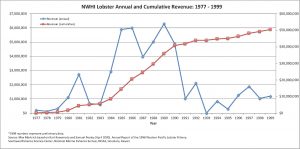News and Announcements
Press Release – WPRFMC Spotlights the History of Hawai‘i Lobster Fishery in Latest Publication (10 November 2020)
 HONOLULU (10 November 2020) The Western Pacific Regional Fishery Management Council has published the first of seven new issues in its historical Pacific Islands Fishery Monographs series. Taking a deep look into the history and current state of some of Hawai‘i’s most important fisheries, the series provides a comprehensive view on the social, cultural and economic impacts of Hawai‘i’s fishing industry.
HONOLULU (10 November 2020) The Western Pacific Regional Fishery Management Council has published the first of seven new issues in its historical Pacific Islands Fishery Monographs series. Taking a deep look into the history and current state of some of Hawai‘i’s most important fisheries, the series provides a comprehensive view on the social, cultural and economic impacts of Hawai‘i’s fishing industry.
Northwestern Hawaiian Islands Lobster Fishery, the first of these new monographs and the ninth overall in the series, is now available. Written by Michael Markrich, the monograph charts the history of what was once the most lucrative fishery in the State of Hawai‘i and the factors that led to its current closure.
Beginning in the 1970s, the Hawaiian lobster fishery quickly boomed in the 1980s, where spiny lobsters like those caught off the coast of the Northwestern Hawaiian Islands fueled the growth of “surf and turf” items at fine dining restaurants nationwide. The fishery entered a period of decline in the following decades, due to factors such as the expansion of marine protected areas in what used to be lobster fishing grounds, such as the marine national monument in the Northwestern Hawaiian Islands. In the two decades it was most active, from 1977-1999, the fishery landed $50 million worth of lobsters.
“Maya Angelou famously said ‘if you don’t know where you’ve come from, you don’t know where you’re going,’” said Kitty M. Simonds, executive director of the Council. “In this series, the Council is taking a thorough approach in documenting where we’ve been, so policymakers and stakeholders can better chart the future of fishing in Hawai‘i.”
The monograph’s findings and perspectives do not necessarily represent those of either the Council or the National Marine Fisheries Service. The Council’s hope is that this history will expand the reader’s understanding of the diverse views of the fishermen, scientists, managers, policymakers and environmentalists who influence federal fishery management. The goal of the series is to provide a captivating history that respects, as best possible, these multiple factions.
A limited number of printed copies are available on a first-come basis by contacting the Council. The publication and prior issues of the monograph series are also available online at https://www.wpcouncil.org/educational-resources/education-library/.
